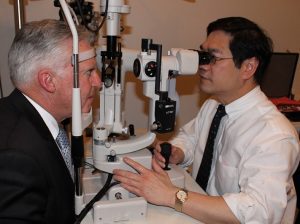
Imagine being invited to watch your child or grandchild’s school performance and while everyone in the auditorium is enjoying the activity, you’re not able to clearly see what is happening.
Imagine having a large black smudge in the middle of your vision.
Sadly, that is how life looks for people experiencing Macular Degeneration.
Macular Degeneration (MD) is a chronic disease which affects central vision and is the leading cause of blindness and severe vision loss in Australia.
Dr William Trinh, recipient of the prestigious Professor Lederer Award for Optometry, stressed the importance of regular eye examinations.
“Sometimes early stages of an eye disease do not have symptoms so it is important to have an eye examination every one to two years. The earlier the disease is detected, the more vision a person is likely to retain.”
It is a frightening fact that almost 1.2 million Australians over the age of 50 are living with some evidence of MD and in South West Sydney the electorate of Fowler the estimated prevalence of Macular Degeneration will grow by 62 per cent by the Year 2030.
Chris Hayes, the member for Fowler, is a supporter of the annual Macular Degeneration Awareness Week, which is on May 22-28 this year.
[social_quote duplicate=”no” align=”default”]“I would urge everyone to have their eyes tested and although it mainly affects those over the age of 50 years, younger people are also at risk,” he says.[/social_quote]
Although there is no cure for MD there are treatment options that can slow down its progression depending on the stage and type of disease, including:
• Having regular eye tests and making sure macular is checked;
• Not smoking;
• Keeping a healthy lifestyle with controlled diet and regular exercise;
• Taking zinc and antioxidant supplement, in consultation with a doctor;
• Adequate eye protection from sun exposure.
